Before I subject you to this, let me but apologize for having been away from the site for so long only to come out of my hole to post this long, vitriolic, intensely late review of a movie that's long since slid from the movie theatres. Since Leonard and Jon have been posting Watchmen stuff, and Brodie's rocking the Spider-Man posts, I got to feeling guilty. I have been busy (trying to get a new job, pray for me) but that's no excuse.
Anyway, here's my crazy long angry Watchmen piece.
In 1998, Gus Van Sant decided the world needed a remake of Psycho, the by-then world famous movie by Alfred Hitchcock. He assembled a cast (including Viggo Mortensen, Julianne Moore, Vince Vaughn and Anne Heche) and proceeded to make a film so rigidly derivative of its inspiration (which was not, by the way, the novel Psycho by Robert Bloch, the source of the original movie - Van Sant went so far as to bring a DVD of the original film to the set and recreate continuity errors from the first film) that it failed to provide any real energy or tension of any kind. In attempting to slavishly homage the first movie, Van Sant created sterile, lifeless film rather than art.
In watching Zach Snyder's version of Watchmen, several scenes in particular were so thoroughly and blatantly intended to be reconstructions of panels from the various issues of the original limited series that they may well have been simply lifted from the book and displayed on screen in the original Gibbons art. Yet, much as Van Sant failed to provide anything the source he was adapting did not already say and in the process made a film that fell to the floor of the theatre with a wet thud, Snyder's Watchmen crashes through the screen as dead as the dogs it so lovingly hurls through windows, their skulls split open. Worse still, not only does Snyder often fail to take any real time to adapt the original source in any way aside from using it as a storyboard, when he does decide to make changes he almost universally detracts from the story.
Watchmen is a twitching ruin of a film wrapped up in the most colorful tinsel Snyder could find, a movie which not only insults the intelligence of the viewer no matter his or her relationship to the source material - my wife, who has not read the comics nor has any intention of doing so, found the movie so tedious and the violence so pointless and lacking in narrative weight that she
almost fell asleep, kept awake only by a particularly bad job of balancing the sound in the theatre and some scenes that took the gore a touch over her comfort level, while I was grinding my teeth any time Matthew Goode opened his mouth. Seriously, what the hell was he doing? - but manages to be plodding and tedious despite constant hyper-kinetic scenes of violence and sex.
Honestly, part of the reason I hated the movie so much is that it's boring, once you get past the eye candy.
It's not bad in a MST3K sort of way. It's competently shot, most of the actors range from good to
very good (Malin Ackerman seems to be on heavy horse tranquilizers for much of the film and I've already mentioned Matthew Goode as Adrian Veidt, a performance made possible by the Snidley Whiplash Foundation) with particular praise being due to Patrick Wilson's performance as Dan Dreiberg.
Billy Crudup's Manhattan was serviceable, although it was somewhat marred for me by his choice to deliver his lines in a voice not entirely dissimilar to that of an ATM machine. Still, the flashback sequence gave him more of a chance to turn in a nuanced performance in a very few lines and he did an excellent job making John Osterman seem like someone real and human in
that time. Matt Frewer turns in a delightful small performance as Moloch, Stephen McHattie does good work as Hollis Mason even if Hollis himself feels completely out of place in the film, a gun on the mantle that never gets fired.
Again, my wife turned to me at one point and said "Whatever happened to that old guy?" and I
had to explain that he was supposed to end up dead. I was even pleasantly surprised by Jackie Earle Haley and Jeffrey Dean Morgan in their roles as Rorschach and the Comedian, respectively. There were scenes that, taken out of the context of the greater film, worked very
well. I thought the credits as a means of establishing the world weinhabit in the film was inspired, music choices helped reinforce the period, and the visual effects were often inspired or purely gorgeous.
Unfortunately, a lot of people (including director Snyder and screenwriters David Hayter and Alex Tse) spend an awful lot of time and effort desperately constructing a meticulously exploded world detail by detail, only to forget to provide this elaborate construction of almost breathtakingly stylized violence, elaborate grotesqueries, exquisite images and fetishization with anything to say.
Considering that the original source that was so thoroughly dissected and pinned to the screen for us by these people was so fraught with ideas, the effort that must have gone into avoiding them to the degree that Watchmen does as a film is rather staggering. You have to have real talent and work very, very hard to manage to take the original comics, reproduce much of them so faithfully that it's like walking into a gallery of photographs of the pages taken at odd angles and yet prevent all but the most broad strokes of the original story's themes and ideas from coming through.
In a way, it's a triumph, a masterpiece of style beating substance brutally and throwing it out of a window so we can lovingly watch each shard of glass float suspended before plummeting to the ground below.
Paradoxically in a 'adaptation' that fails on many levels to adapt anything, a film where the director and writers seem resistant if not outright horrified at the idea of trying to make the story inhabit the new artistic medium it's being created in, rather taking the original text as a kind of animatic or storyboard, the film also manages to fail when the screenplay or director feels compelled to deviate from the source. The reason Ozymandias' plan had a chance of succeeding in the comic is because, in a world on the brink of nuclear armaggedon, a gigantic squid monster appearing in New York and killing half a million people with a psionic death scream was so alien that it would not immediately cause the calamity it was intended to prevent.
But having Dr. Manhattan appear to have blown up several cities across the world presumes that the hostile nuclear armed powers of the time would wait to launch their missles and not simply let everything fly the second a big explosion took place in a major city. I'm sorry, but
it doesn't make any sense at all. The second Moscow went up, missiles would be headed for the USA, especially when the movie clearly shows us that Moscow is already under attack by Adrian's device before it moves on to New York.
Sure, the explosions are keyed to Dr. Manhattan's energy signature. Why would that keep the Russians from nuking the US? The Russians expect Dr. Manhattan to do things to them. They know he's American. They're afraid of him. The movie spends two hours pointing out that they're willing to go to the brink of war in the face of him. In order for the plan to have worked, New York would have had to have been hit first. So in just this one example of the film deviating from the original story it manages to butcher it and makes itself insipid even if you don't remember the original story at all. You're trying to prevent nuclear apocalypse?
You don't nuke people! The giant squid works precisely because it is absurd, ludicrous, so completely out of the pale that its sheer implausibility forces people to stop before unleashing their own destruction while also providing an enemy that is unfathomable, alien and yet still
possible to defeat (since clearly the body in the New York City aftermath is dead) while Dr. Manhattan as global annihilation is familiar, as nuclear as the other warheads, and provides at once no more threat than the stockpile of warheads we've already had mentioned several times in the film, while also being totally unstoppable.
Why should his act unite the world? They can't do anything about it. There's no 'alien corpse' to give the world a rallying sign, nothing that can be stood up to and fought. There's just a blue god who wipes cities off the face of the earth for the terrible crime of being populated by a species that... was about to wipe those cities off the face of the earth.
Similarly, the film manages to steal the great impact of the final encounter between its protagonists while still striving to reproduce it panel by panel: it's awesome to see Dr. Manhattan punch through the glass roof of Adrian's redoubt, but not only does the story fail to deliver any of the real tension (we never have to consider Adrian as possibly being right thanks to Goode's performance channeling Vincent Price's later years on mescaline) but when Rorschach dies, we get Nite-Owl watching it happen, which changes his complicity in events and makes the romantic movie ending almost obscene. You know, the one where he and Laurie make out in his living room while talking about the omnipotent blue boogeyman keeping the world in line and Laurie delivers Dr. Manhattan's best line (the one that rebuts pretty much everything Adrian has ever done or worked to do) gutting the last chance for the film to make a point like a trout in the process.
Every creative decision made in the last third of this movie to deviate from the source ruins it, while every creative decision to hew blindly to the source in the first two thirds leaves it devoid of any real identity or message. Like I said, it manages an almost impossible feat, you really almost have to admire its sheer craft. It's like watching a team of masons painstakingly craft an outhouse out of Belgian Marble.
I could go on. The scene where Rorschach reveals the reason for his violence and brutality is weakened by elision: removing the scene with the gas can, hacksaw and handcuffs makes a simple, brutal explosion of violence out of what had been a far more complex turning-in, a murder that is also an act of violence by Rorschach against who he had been.
The sex scene between Laurie and Dan managed to be rather faithful to the comic while at the same time totally missing the point (and being quite frankly a lot more like a bad Cinemax film than I was expecting). And Rorschach's narration, which works fine in the comic, actually could have benefited from some pruning in scenes where we have tools like music to help set a mood.
In the end, if I had never seen the comic book, I would have dismissed Watchmen the movie as a
visually interesting, ambitious failure on the level of Ang Lee's failed Hulk movie. But because I know how much better it could have been, I end up totally disgusted with it. It abandons the heart and mind of the original in an attempt to stuff and mount the body after pulling them out.
Wednesday, July 29, 2009
Tuesday, July 28, 2009
Sewer Diving: Fear is a Slinking Cat I Find Beneath the Lileks of My Mind

Those of you familiar with the work of humorist-writer-scold James Lileks will also be familiar with the sensation of thinking that he’s a schmuck even when you agree with him. Such is the case with his recent review of Watchmen.
Lileks is a very good humorist, and a skillful and perceptive archivist of cultural detritus. He is also, unfortunately for those who enjoy his work in those fields, a pedantic and short-sighted right-wing scold, an inveterate foe of the unconventional, and one of the worst cultural critics in the world. He’s wonderful at finding something funny to say about things, and terrible at finding something intelligent to say about them, with a keen grasp of what they are and no grasp whatsoever of what they mean. He also only knows seven things, and the two most important are these: The Sixties Ruined Everything, and Anyone Who Doesn’t Like Conventional American Politics And Culture Is Basically Just A Dad-Hating Punk Who Smokes Dope And Complains About How, Like, Mall Security Guards Are Totally Fascists, Man.
These points are hammered home in spades with Lileks’ Watchmen review; we both disliked the movie, but for distinctly different reasons. Let’s take a look.
The characters. Small point, but I wish the movie had characters I enjoyed. Silk Spectre was awful; Nite Owl was pudgy-dull, with all the gravitas of a hospital administration bureaucrat, and yes I know that’s the point; Dr. Manhattan was interesting, inasmuch as whispering superbeing with cerulean salami hangin’ free is interesting, but you have to admit it’s difficult to identify with a character who has Mars as his personal chill-pad.It appears not to have occurred to Lileks that Alan Moore made Dr. Manhattan difficult to identify with for a reason, and if it had, he would have complained about it. He goes on to say that the most unpleasant characters are the most interesting ones, a banal observation to anyone who has paid any attention to the development of the novel for the last 150 years or so, but a shock to Lileks, who writes books but does not read them. It will no doubt come as a surprise to him in a decade when he’s nosing through his daughter’s freshman-year coursework and he discovers that Madame Bovary is not especially likable.
I dislike any movie that makes me wonder whether that’s a good Eleanor Clift impersonation.Lileks, apparently, lives in a world where he is constantly inundated with movies that demand of him a judgment on the quality of their Eleanor Clift impersonations.
The source material. Look. I love graphic novelsName three.
and this one gets props for upending the Superhero Mythos when it did, but great writing it isn’t, and brilliant insight it lacks.Sure! It’s only the most highly praised book in the history of the comics medium; but great writing it isn’t. One wonders, if Watchmen lacks it, what graphic novel he thinks contains actual brilliant insight. The Avenging World? Ironwood?
I much preferred “Marvels,” which came along later, and had better artWell, of course you did.
the illustration in “Watchmen” never bowled me over, and the coloring was often horrible.There’s a lot of smart comics fans who would agree that Dave Gibbons’ art wasn’t the best fit for Watchmen, but the coloring? Seriously? His enjoyment of what’s widely regarded as the best superhero comic of all time was ruined by the coloring?

From here in 09 I could smell its 80s roots - dated, sorry, tired politics that lack anything other than sullen adolescent angst and dorm-room bong-session insight.And here we get to the heart of it: Watchmen was an anti-authoritarian book with a rebellious (and arguably leftist) viewpoint, and from Lileks’ neo-Zhdanovite soap bucket, nothing with those qualities can possibly be any good. Never mind its intricate structure, its clever narrative, its savage moral lessons, its masterful dialogue, its thematic daring, its heartrending emotional moments: it is clearly of, by, and for a bunch of snotty dope-smoking pseudo-intellectual teenagers.
Reminded me of the Dark Knight comics: Reagan was President, which somehow explained why the cities were such horrid dystopias. Makes sense, doesn’t it? Doesn’t it? Some how?Just in case you’re missing the subtlety here, Lileks is accusing Frank Miller — one of the most conservative creators in the comics industry, and a guy who unabashedly glorifies the totalitarian vigilante aspect of Batman — of being a leftist tool.
Same here: the reign of Nixon (Jeezum crow, Nixon) ties in with urban decay, filth, moral calumny, and all those incidents of debauched decline Rorschack [sic] decried as he walked the mean streets.Ha ha, those crazy hippies! Still attacking Nixon, just as if he still had some kind of cultural or political influence on America! This sentence is so ridiculous it’s hard to know where to start: did Lileks somehow miss the part of Nixon’s presidency where the country was plagued with urban decay and moral calumny? Did he think that Rorschach — the book’s most obviously right-wing character — was decrying conservative rule? Did he even pay attention to how things were during Nixon’s term of service, and the reason he was driven from office?
I may be particularly sensitive to this stuff because I get rashes when the ideas and tropes of the Sixties are trotted out as prima facie truths - as though a reference to Vietnam and a snippet of Simon and Garfunkel is like some scriptural quote I’m expected to swallow without question.
Actually, he gets rashes when the ideas of the Sixties are mentioned at all.
One exchange stuck out - by which I mean, it made me roll my eyes so hard I almost tipped the couch over. “What happened to the American Dream?” Owl-guy says to the Comedian, after they’ve dispatched a late-night demonstration demanding more police, instead of masked vigilantes. “It came true!” grins the Comedian, meaning, all the violence and oppression and fear and war.The Comedian, of course, is presented as an amoral nihilist, but that won’t stop Lileks from vaporing about this throwaway line:
It’s all very deep when you’re in high school and the ‘rents are being total Nazis. At this point, though, no one’s used the term “American Dream” without scare quotes since the second episode of “Laugh-In,” so any piercing insight may ping off the skins of viewers who don’t stamp around the mall glowering at the Phonies.And there we go again: anyone who questions the rightness of Lileks' grandpa’s conception of the greatness of our country is a huffing, puffing, teenage jerkoff who hates Dad and Santa Claus and sulks around the house spelling America with three Ks. Any criticism whatsoever of the country, its economic system, or even its leadership (when that leadership happens to be Republican) reduces you to this Holden-Caulfield-Meets-Abbie-Hoffman stereotype.
It’s an artifact of the 80s counterculture, an echo of the dyspeptic souls who masked their hatred of humans with high-flown concern for humanity, a bizarre example of reality denial: the war they insisted was an inevitable outcome of the US posture in the 80s never happened, so they remake the era with Nixon at the helm and kill millions to force us to come to our senses so we won’t do the thing . . . that we didn’t do.Because Reagan did not actually carry out the nuclear war ‘80s liberals nervously feared he would, the criticism of his overaggressive, pointlessly expensive, and often ineffective Cold War gunboat diplomacy is therefore a “bizarre example of reality denial”, and those citizens of this and other countries who feared that America or Russia might annihilate their families in order to make a political point were consumed with a “hatred of humans”. Also, it’s funny that he says liberals have to invent a false reality in which a third-term Nixon brings America to the brink of war in order to fight communism, since in our (real) world, the actual Nixon considered nuking Vietnam, and supervised the illegal bombing of Laos and Cambodia which killed tens of thousands of people. Who needs fake Nixon when we’ve got the real thing, eh, Jim?
Its thematic tone-deafness and utter obliviousness to what made the Watchmen comic so good in the first place (hint: nobody, but nobody, thinks it was its politics) make this a perfect example of why Lileks should stick to what he’s good at. Funny he is, but a good critic he isn’t, and any insight he lacks.
Spider-Man Gets His Butt Whupped Week - 7: The Scorpion
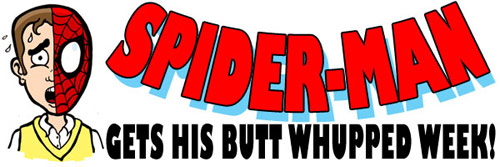
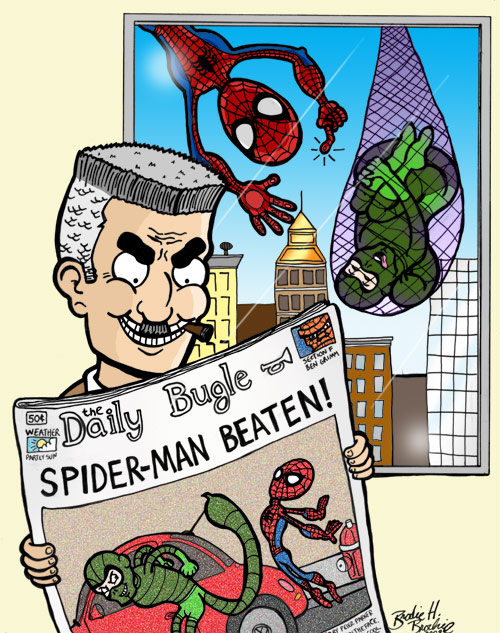
Has it really been a week of Spider-Man butt whuppins already? Yes, my friends, I'm afraid we've reached the end.
Today's villain is Mac Gargon, aka The Scorpion, a villain who has always tried to use his mechanical tail to stick a sharp protrusion into Spider-Man's thorax, but a bigger thorn in Spidey's side has always been J. Jonah Jameson.
That's Jameson, the publisher of The Daily Bugle, in the foreground, gleefully looking at a copy of his paper with a picture of Spider-Man getting his butt whupped on the front page. Apparently there's also something that delights JJJ on the back page too, possibly a particularly hilarious installment of "Hi and Lois." Jameson has always hated Spider-Man, various explanations have been offered over the years, but none of them have really ever done the job. I think the simplest explanation is just that Jameson is a jerk and it's just Spider-Man's bad lick that he's gotten the biggest helping of that jerkery.
But while we do have a picture of Spider-Man getting his butt whupped on the paper, as we can see outside of the window, our favorite arachnid came back for a round two and ended the week victorious! Poor J. Jonah Jameson, in a moment he'll hear the tapping, turn around, and realize he's going to need to run a correction in tomorrow's edition. That guy has to print retractions more often than Spider-Man gets his butt whupped. And as you've learned over the past week, that's kind of a lot.
Tomorrow: I don't know. Do whatever you want tomorrow, this is really the last one of these!
Labels:
character: Spider-Man,
medium: art
Monday, July 27, 2009
Spider-Man Gets His Butt Whupped Week - 6: The Green Goblin

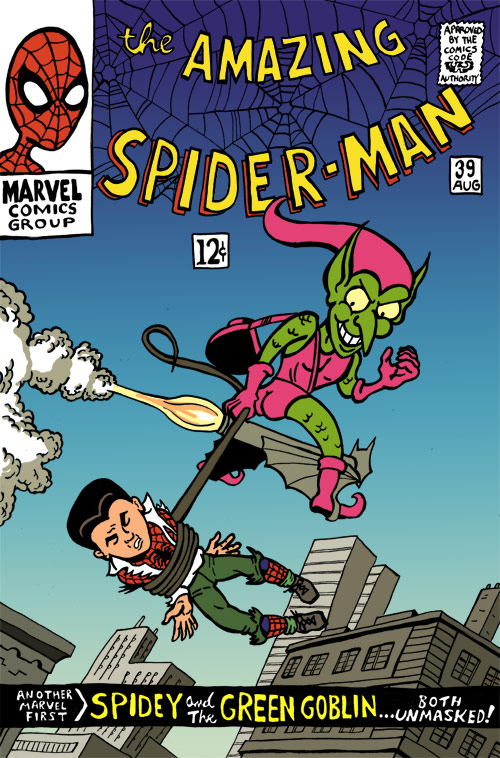
Today's installment of Spider-Man Gets His Butt Whupped Week is another cover version of a famous Spider-Man cover, this time going all the way back to the cover of Amazing Spider-Man #39, drawn by John Romita (who I talked about back in the first installment of this series).
Norman Osborn, the Green Goblin, is generally considered Spider-Man's #1 bad guy, his arch enemy. I guess killing the hero's first true love will earn you that kind of cred. That's probably why, when Spidey first made it to the big screen, GG got to be the villain. Sadly, in that movie he dropped all the purple parts of his costume. Less fashion daring meant he seemed a lot less daring all together. Shockingly, after three movies and four villians, we have yet to see a shred of purple cloth yet. Here's hoping if Mysterio ever makes it to the movies, he won't be forced to be less fabulous.
For an older guy, Norman keeps up on his work out regime pretty good, doesn't he? Either that or it's the Goblin serum that keeps his glutes so tight.
TOMORROW: In our exciting conclusion, we present a picture of Spider-Man getting his butt whupped AND Spider-Man triumphant, all in one picture! How can his be? Find out when the Scorpion strikes!
Labels:
character: Spider-Man,
medium: art
Sunday, July 26, 2009
Spider-Man Gets His Butt Whupped Week - 5: The Vulture

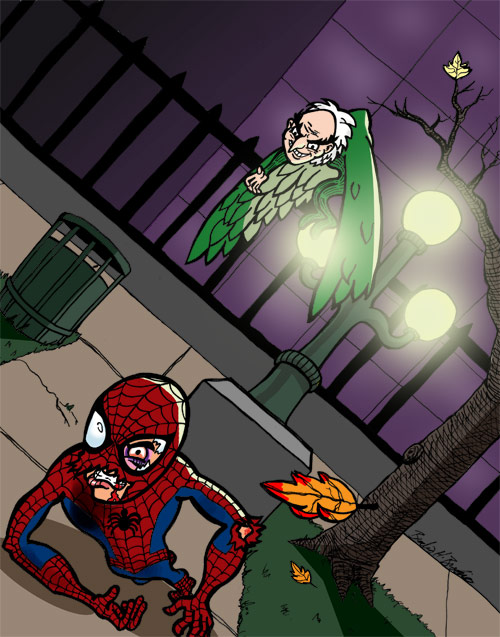
Spider-Man's butt whuppin' for today comes courtesy of The Vulture, aka Adrian Toomes. The Vulture debuted in Amazing Spider-Man #2 and is, therefore, the first classic Spider-Man villain (issue #1's villain was perennial B-lister The Chameleon).
The vulture's power? His suit slightly increases his strength, and he can fly. That's it. And the great thing about The Vulture? That's plenty. He's always been totally confident about his ability to get away with anything based on these mild and pretty common powers. "No one can stop a man who can FLY!" he would yell, flying away from a crime, unconcerned with the fact that he certainly could not fly faster than bullets.
Another great thing about The Vulture - he's old. Super crime is usually a younger man's game, what with all the running around and punching. Middle aged men in the business usually take more of a criminal mastermind
role than a physical thievery modus. The Vulture, however, is a card carrying member of the AAERP (American Association of Evil Retired Persons) and he's out there scrapping and runnin' with the youngins.
Writers over the years have fretted, repeatedly, that The Vulture's old age make him an unintimidating enemy, replacing him with a younger protege, replacing him with three upstarts. Recently, they've replaced him yet again with a acid-spitting mutant cannibal (and the only interesting scene in that story was when Spidey went to talk to old Adrian in his jail cell about the new guy). The simplicity of Adrian's powers, the unusual aspect of his age, and his general creepiness are the things that make him such a strong and memorable character. I don't know how many times new writers will try to replace him, but I do know they'll always come back to the original.
TOMORROW: Green grinning Goblins come out to terrorize!
Labels:
character: Spider-Man,
medium: art
Saturday, July 25, 2009
Spider-Man Gets His Butt Whupped Week - 4: The Lizard

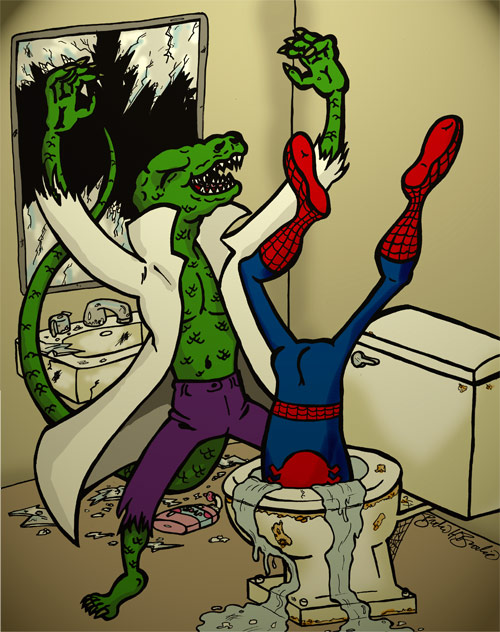
Curt Conners was a brilliant scientist who had a hard time dealing with the fact that he'd lost an arm (I don't know how. Possibly it was fed to a crocodile by an immortal child). One day, curt noticed that lizards are able to re-grow tails that they lose and figured that maybe if he bonded lizard DNA with his own, he might grow back that missing arm.
Incredibly, Curt had figured right! Unfortunately, he did not also figure out that it would turn him into a crazy human-hating man/lizard monster (and, for some reason, give him the ability to control reptiles).
Here, the lizard has whupped poor Spider-Man good and is trying to find the quickest way to take him back to his lair in the sewer. You just know once he gets out of this Peter isn't going to just throw the costume away, either. He's going to try washing it and washing it and washing it, but it will never be OK to wear it again.
TOMORROW: The wings of the Vulture!
Labels:
character: Spider-Man,
medium: art
Friday, July 24, 2009
Spider-Man Gets His Butt Whupped Week - three: Electro

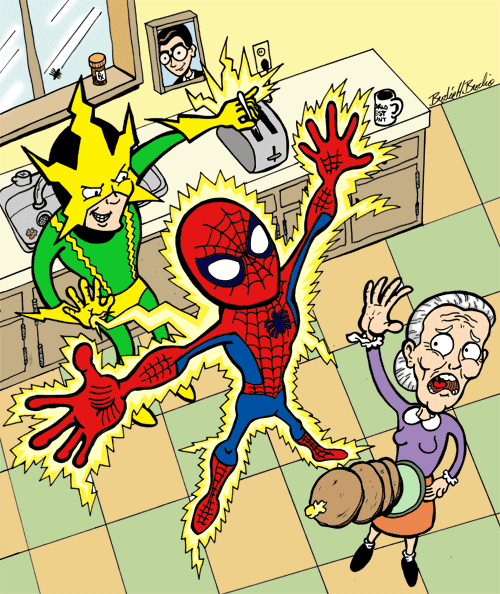
BONUS: Click here if you'd like to see the static/non "animated" version of this picture.
Max Dillon was working on power lines (lookin' in the sun for another overload) when he was struck by lightning and given the power to conduct and control electricity). It's a little known fact that the same thing happened to Benjamin Franklin after the kite and key incident. He took to using his electrical powers to punish those who had voted against the turkey as the national bird and to terrorize French prostitutes (or something like that. I'm more up on my comic book villains than American history).
Also in today's picture is Peter Parker's dear old Aunt May. I'm not exactly sure what brought Electro to Aunt May's kitchen in the first place. I think maybe he was casing one of the neighbor's houses and then was drawn there by the inviting aroma of wheatcakes. What are wheatcakes, you ask? They appear to be what you and I and everyone else call "pancakes" (occasionally "griddle cakes" or sporadically "flapjacks"), but what Aunt May calls "wheatcakes." Perhaps they have a higher wheat content. I don't know, Aunt May won't give me the recipe. Anyway, she's dropping them now, so it looks like there won't be wheatcakes for anybody. Thanks a lot, Electro.
When he's not playing supervillain, Electro also has a career in movies, having starred in films such as "The Flamingo Kid," "Rumble Fish" and "There's Something About Mary (Jane Watson)."
TOMORROW: Near the lair of The Lizard!
Labels:
character: Spider-Man,
medium: art
Thursday, July 23, 2009
Spider-Man Gets His Butt Whupped Week - 2: Kraven the Hunter

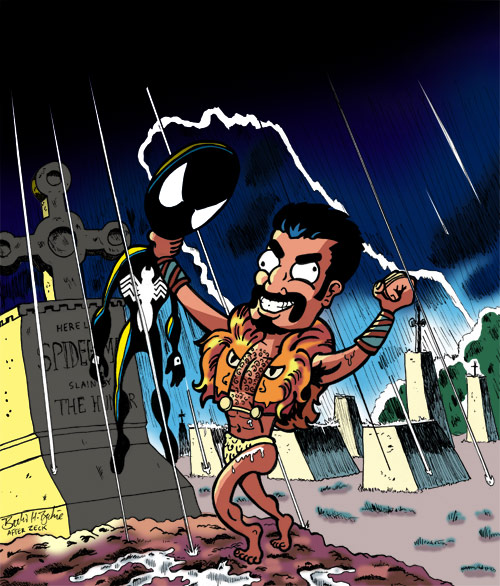
Today's installment of SMGHBWW is a cover version of the cover of Amazing Spider-Man #293 drawn by Mike Zeck and featuring Spider-Man villain Kraven the Hunter. I've taken the liberty of replacing the empty costume Kraven is holding in the original with an unconscious Spidey because otherwise this wouldn't be a picture of Spider-Man getting his butt whupped so much as a picture of Spider-Man being buried alive (and not actually in the picture).
Originally, Kraven was a big game hunter who had hunted every kind of dangerous animal the world had to offer and came to New York City seeking the challenge of the most dangerous prey of all - Spider-Man! The storyline this picture came from was the classic "Kraven's Last Hunt" in which Kraven has gone a bit (more) insane from his years of being defeated by Spidey and vows to finally kill the web-spinner and then replace him as a better Spider-Man.
KRAVEN'S PLAN
Step one: stop wearing pants.
Step two: When you finally get a net on Spider-Man again - just shoot him for once (with a tranquilizer).
Step three: Bury him (strike that, hire someone to bury him)
Step four: Get naked and eat a ton of Spiders to become the new Spider-Man.
Step five: Find foe Spider-Man needed help to beat (Vermin the Rat Man? Really?). Beat him 'til he cries for mommy.
Step six: Having proved yourself better than Spider-Man, commit suicide.
Oh, that Kraven. Did he know how to have a good time or what?
Tomorrow: Electro! Wheatcakes! Animation (kind of)!
Labels:
character: Spider-Man,
medium: art
A Free Gift from Us to You: ComicCon Bingo
Visiting San Diego this week for the world's largest unholy paean to America's most venal and petty forms of entertainment? Well, compete with your fellow gawking tourists in the land of merchandising and mouth-breathing with this handy high-res version of COMIC CON BINGO!

(click for the high-res printable version, and enjoy, nerds!)
Spider-Man Gets His Butt Whupped Week - One: Doctor Octopus

Spider-Man is my favorite superhero. This week, his flagship title, The Amazing Spider-Man, reached its 600th issue, so I've decided to post a week-long series of drawings celebrating Peter Parker's more colorful alter ego.
What's one of the things we love most about Spidey? His perseverance. His tenacity. His drive to keep fighting, no matter how overwhelming the odds. How he takes a liken', but keeps on tickin'.
Another great thing about Spider-Man is his fantastic roster of villains, arguably the best in comics, inarguably one of the best two (lots would probably give Batman's loony louses the top spot). The web-head's colorful criminals are a compelling group of nutjobs who are also pack a visual punch.
So, starting right now and for the next six days (I'm doing two today to catch up to where they've been posted elsewhere already), we'll highlight these two aspects of the Spidey charm by presenting a series of drawings of some of Spider-Man's most fearsome foes handing him his hat.
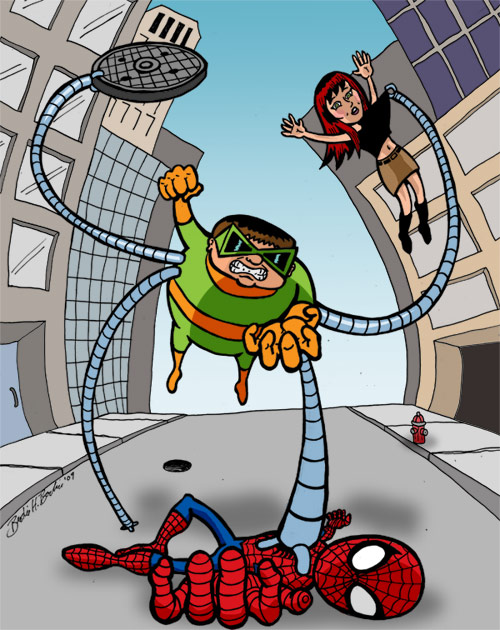
First up on our parade of pain is the tubby tentacled terror of Doctor Otto Octavious, aka Doctor Octopus, aka Doc Ock! Poor spidey's being pressed to the pavement, the world seeming to crash in around him, Mary Jane in peril, and the doc about to deliver the big finish with a manhole cover.
Doc, like all the villains we'll be highlighting during Spider-Man Gets His Butt Whupped Week, was created in an amazing flurry of creative genius by Stan Lee and Steve Ditko during their inaugural tenure on The Amazing Spider-Man. Never before or since has some a classic collection of rogues debuted in such a short amount of time.
I drew this installment early on, before I realized that all the bad guys were going to be Ditko and Lee creations. Had I realized that, I might've put Betty Brant or Gwen Stacy in Doc's clutches instead of MJ. Mary Jane isn't really a Ditko creation, even though she technically appeared briefly in a couple of Ditko's issues. In those appearances, though, she was kind of like the neighbor in Home Improvment, always a flower in the foreground or something obscuring her face. She didn't dress anything like the mod party gal we came to know later and we never even saw her signature scarlet locks. I guess you could credit Ditko with creating Mary Jane's breasts, which isn't all bad, but the rest of the look goes to Ditko's artistic successor, Jazzy John Romita.
Ditko may have been the great creator, but I think Romita's pencils are the ones that really created the definitive look for Peter Parker and his pals in most people's minds, and while Ditko deserves all the praise he gets, I think we sometimes forget that.
Next up: a cover of a cover and a wild whuppin' courtesy of Kraven the Hunter!
Labels:
character: Spider-Man,
medium: art
Tuesday, July 21, 2009
Open Forum: After The Watchmen, What Next?
 You may have seen Grant Morrison's recent interview regarding his upcoming Multiversity series for DC, wherein he promised a sequel of sorts to Watchmen, using the original Charlton characters on which Moore's landmark creations were based. With that and the release of the film on DVD today, I got to thinking about that old saw regarding whether any sequel to Watchmen is even possible - so i pitched the question to our Seebelow contributors; Assuming that it was Alan Moore returning to these characters, what stories do you think are left untold in Watchmen?
You may have seen Grant Morrison's recent interview regarding his upcoming Multiversity series for DC, wherein he promised a sequel of sorts to Watchmen, using the original Charlton characters on which Moore's landmark creations were based. With that and the release of the film on DVD today, I got to thinking about that old saw regarding whether any sequel to Watchmen is even possible - so i pitched the question to our Seebelow contributors; Assuming that it was Alan Moore returning to these characters, what stories do you think are left untold in Watchmen?Jon • For my part, I am utterly uninterested in seeing anything about the world that follows the culmination of Adrian Veidt's master-plan - particularly given Moore's recent trend towards dense symbolist utopias. I think there are smaller stories that have greater inherent gravitas than a post-telepathic-squid future and some sort of speculative second generation peace built on inherited fear. (I also harbor the suspicion that, were Moore being honest with himself, he'd come to realize that there are only two stories which can come after Watchmen - either Ozymandias takes up the habit of reinforcing his Pax Phobium every few years with new spins on the old telepathic alien, and the public grows lax and restless with the idea of nebulous threats, eventually turning to new/old enemies OR he doesn't do that and everyone goes back to their old ways even sooner. We've alreadfy seen how catastrophic fear of an unseen enemy affects the world, and it doesn't change us as much as the Outer Limits would have us thing ... As I saw in someone's sig file once; 9/11 was our giant telepathic squid, and it didn't change anything).
As for what stories scream out to be completed; I think the general answer would be "The Adventures of the Minutemen," which is a very general request but certainly one that is testament to Moore's ability to breathe life into these characters who moved in an only transitory fashion across the page. Personally, the one Minuteman whose life I'm most curious about is Hooded Justice - it's only alluded to, but certainly definite, that the Comedian killed Hooded Justice, but the circumstances of that meeting and the events leading the guy who might have been an immigrant strongman but you can never tell with Moore sounds fascinating to me.
Likewise, and given Moore's penchant from langorous tales of exotic sexuality, I think the story of the Silhouette begs to be told. I'd love to see him re-approach that character ... if I remember correctly, she never even receives a line of dialogue in the book (ed - Leonard corrected me, she has exactly one great line), but she was immediately fascinating for all her excesses against assorted taboos.
For more modern subjects, in rereading the book this time, I was drawn into The Comedian's breakdown following his discovery of Ozymandias' hidden island, and strongly believe that a story covering that timeframe would be terrific, and would create an even greater depth for the world of the Watchmen.
Leonard • This is a pretty good topic, and one that I’ve unsurprisingly given a lot of thought to. For my part, I share Jon's interest in both Hooded Justice and the Silhouette, but the Minuteman whose untold story hooks me the most is poor ol’ Byron, the Moth-Man. The one time we see him, he’s clearly insane, and Hollis hints that he’s also been shattered by alcoholism, but he’s not just a run-of-the-mill DT-plagued drunk; you have to think that in Moore’s world, there had to be some underlying issue that forced him down the path of drink and madness, and I’d be keen to know what it was.
Leonard • This is a pretty good topic, and one that I’ve unsurprisingly given a lot of thought to. For my part, I share Jon's interest in both Hooded Justice and the Silhouette, but the Minuteman whose untold story hooks me the most is poor ol’ Byron, the Moth-Man. The one time we see him, he’s clearly insane, and Hollis hints that he’s also been shattered by alcoholism, but he’s not just a run-of-the-mill DT-plagued drunk; you have to think that in Moore’s world, there had to be some underlying issue that forced him down the path of drink and madness, and I’d be keen to know what it was.
The events that triggered the passage of the Keane Act are also a perennial candidate for the Greatest Watchmen Story Never Told, as well. It doesn’t seem like it would play out as simply as it did in the comic: Dr. Manhattan aside, and it’s unlikely too many people would openly badmouth him, I can’t see how the extremely limited activities of five non-powered costumed crimefighters would so enrage the public. They’d all be limited in geographical range; even someone as skilled as the Nite Owl/Rorschach team couldn’t cover more than a few miles or thwart a few crimes a night, so it hardly seems possible that they’d be putting the cops out of business. And even if they were particularly brutal and unconstitutional, well, the American public has always been pretty forgiving of that from authority figures, particularly during the real-world Nixon Administration. I suspect there was something more, something bigger behind the passage of the Keane Act.
Finally, just because they’re always more interesting than the heroes, I’d like to get a few stories of the super-villains the Minutemen and their successors faced. We know who Moloch was, but we don’t know what he did, or how he rose to a position of such power as a mere stage magician; and it might be a kick to see Captain Axis, the owner of the giant gorilla mask at Minutemen HQ, and “Dusk Woman” or “Twilight Lady” or whatever her name was in action.
Austin • I was always really interested in how Moloch could foil or escape a real-life wizard like Dr. Manhattan as well, but what really made me go 'uh...' was what was happening behind the Iron and Bamboo curtains in the early days of Dr. Manhattan's time in the Army.
Matt • I've actually been musing about the comic books of the Watchmen universe for quite some time. For some reason I imagine Gold Key doing really well with their TV show adaptions and stuff. But in general I wonder what the fiction and especially the fantastic fiction of that world was/is like. We know there's no Superheroes... did Dr. Manhattan destroy science fiction? Did Heinlein write any of the semi-trippy novels he's famous for? Did Moorcock? Did the first wave of revival interest in Lovecraft take off?
No Vietnam, no Watergate, and a big blue glowing American god: what did they dream about? Read about? Think about?
Ed • I think, of all the material in Watchmen that I'd like to see readdressed, it's the Tales of the Black Freighter. Is the Black Freighter a ghost ship? Does it harvest fallen souls, or create them? Is there any connection between this boat, and Moore's other Black Freighter, the Nautilus? Where did the other members of the crew come from? I keep meaning to reread these portions of the book, and the supplemental material to see what other info I can glean, but I also keep meaning to clean garbage out of my front yard and wash the dishes too.
RJ • I'd like to see a short story about a once-successful Hollywood producer. Maybe a Robert Evans-type, pretty successful in the 1970s, but then had a string of flops and is now closer to Harry Zimm. No one's returning his calls, he can't scrape together funding for a new picture to save his life. He has a shoddy little office above a taqueria a couple of blocks off of West Sunset Boulevard, full of posters and props from his career, all covered in dust. Some afternoon, he's just sitting there at his desk, finishing off a bottle of Clan MacGregor when the phone rings. The person on the other end says she has foreign investors looking to put up large amounts of money for an elaborate horror film to be shot somewhere in the tropics and the failed producer is just the man they think could put the whole thing together and would he be interested? How about for a huge fee upfront and a generous percentage of the gross and foreign distribution? Oh, sure, they'd even throw some funding toward the film he's been wanting to make for years- a personal project- a picture about the sinking of the Maine. Wonderful! A comic book writer is working on a draft of the horror screenplay right now. One catch- the whole thing has to be rather secret, you see, as it involves some new processes and special effects other studios would simply love to get their hands around.
Also- the designers at Veidt's toy division- "We spent eight months on these! 'No enemies anymore'?!? That's bullshit! Jesus christ, we even laid out the fucking catalog. Damnit, I should have taken that gig at Mattel."
Labels:
theme: Open Forum
Monday, July 20, 2009
Twits: Blackest Night
File under: We all deserve what we get.
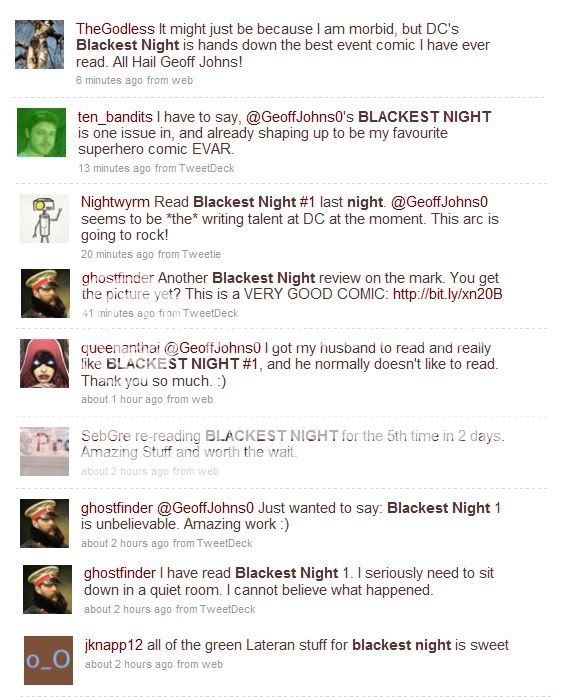
Mostly, I feel sort of bad for Ghostfinder. He appears to be having some sort of meltdown.
Friday, July 10, 2009
Art: Why don't you just shrink the entire world?
 I was looking at a collection of photos from the 2009 Venice Biennale over at the wonderful Big Picture Web log, when number 19 caught my attention.
I was looking at a collection of photos from the 2009 Venice Biennale over at the wonderful Big Picture Web log, when number 19 caught my attention.A visitor looks at a work by US artist Mike Kelley "Kandors full set 2005-2009" on show during the opening of the Punta della Dogana in Venice on June 3, 2009.
"Kandors"? It can't be. I mean, it sort of looks like it, but do they actually mean that Kandor?
Yes. Yes ,they do.
Mike Kelley’s synaesthetic Gesamtkunstwerk updates earlier holistic Utopias of harmony and universal communication – from the early-20th-century experiments of Russian composer Alexander Scriabin to the multimedia design environments of the 1960s – by introducing another key 20th-century myth of reconciliation and salvation: Superman. The title of the show, ‘Kandors’, references the eponymous city on Superman’s home planet of Krypton that was saved in miniature form under a bell jar by the superhero and transferred to his ‘Fortress of Solitude’ after an evil alien had shrunk Kandor and its inhabitants to the size of a toy. This transportable city-in-a-bottle is emblematic of Superman’s traumatic childhood and symbolic of the double loss he suffered of both his parents and his homeland.Very interesting, beautiful and surprising to find.
The 2009 Venice Biennale [boston.com/bigpicture]
Mike Kelley [Frieze Magazine]
Labels:
character: Superman,
medium: art
Subscribe to:
Posts (Atom)